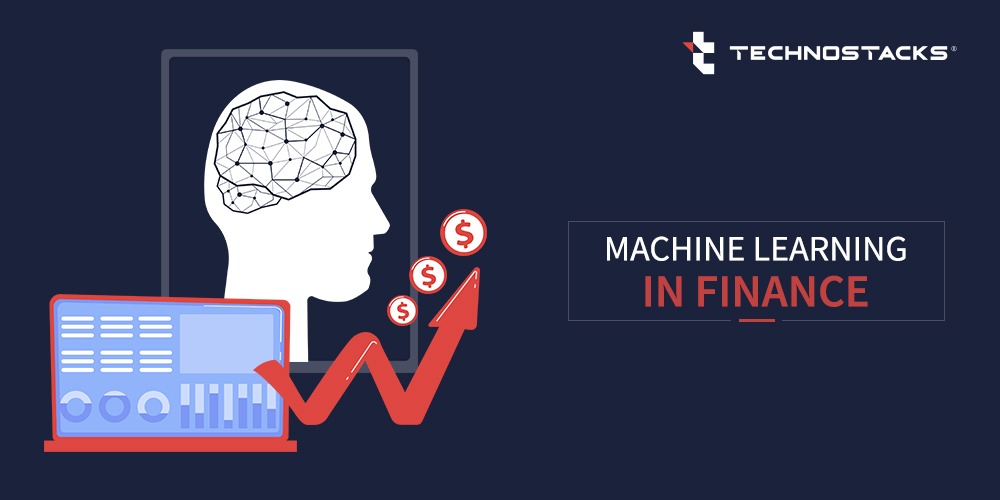Ways Machine Learning Can Be Used In Finance
Machine learning is a facet of Artificial Intelligence (AI) and a data analysis method based on the idea that computer systems and machines can learn from data by identifying patterns and making decisions without excessive human intervention.
The global machine learning market is estimated to grow from USD 1.41 Billion in 2017 to USD 8.81 Billion by 2022. Machine learning can be used in diverse industries and the finance sector is one of those. To precisely enable financial establishments to identify suspicious activity and prevent fraud is again the functionality of machine learning.
The shopping recommendations you receive based on your online activity and purchase history result from machine learning. Finding new sources of energy and analyzing minerals in the earth: is a product of machine learning.
Applications of Machine Learning
Machine learning has wide applications in today’s world where new data is continuously being developed, enabling machines exposed to this data to learn and independently adapt for various functions. This learning process is a continuous one where machines regularly train from previous computations to produce reliable results. Though machine learning finds uses in many areas, this article explores machine learning in finance and the multiple applications of machine learning right in the financial domains.
What is Machine Learning in Finance and How It Can Be Used?
Banks and other finance industry organizations rely heavily on machine learning for two significant purposes: preventing fraud and identifying critical insights in data to study investment opportunities and assist investors in trading. Additionally, machine learning can enhance revenues by improving productivity and user experience. Also, process automation with machine learning can significantly cut back operational costs and can provide better security and compliance.
Machine learning for finance utilizes data mining to identify high-risk profiles and carry out cyber surveillance to detect signs of fraudulent activities. Aside from these essential uses, machine learning algorithms and other Artificial Intelligence principles are regularly employed in finance domains for other essential purposes. Here are some ways machine learning can be used in finance:
- Algorithmic TradingIt is the use of algorithms to make better trading decisions. The volatile nature of the market underscores the need for employing data-driven strategies to achieve success in trading. Previously and even now, to a certain extent, traders use mathematical models to detect factors that influence the rise and fall of security prices. These models monitor trade activities and business news constantly, in real-time, to make their predictions and come with presets on various parameters like price, timing, and quantity to place trades without the need for constant involvement of the trader.On the other hand, algorithmic trading can simultaneously analyze massive volumes of data to make thousands of trades daily. Through faster trading decisions enabled by machine learning in finance, human traders hold an advantage over the market average.
Furthermore, automation removes human limitations such as emotions and personal aspirations, which can easily impair human traders’ judgment. Therefore, it is one of the best examples of machine learning in finance.
- Fraud Prevention and DetectionFinancial fraud causes billions of dollars in losses every year for financial services organizations and banking institutions and is a major concern for these establishments. Financial companies store large amounts of data online, the risk of security breaches increases.Machine learning can be used to detect fraud in financial institutions. With the advancement of technology, financial fraud now poses a threat to precious and sensitive data.
At the same time, it is the advancement of technology that is providing competent solutions to these modern problems. Whereas in the past, fraud detection systems were designed on sets of rules that fraudsters could easily circumvent, recent applications of machine learning in finance allow companies to flag fraudulent transactions and combat them to minimize damage.
So, the question is how machine learning is used in finance to detect fraud. It does this by scanning large volumes of data sets to detect activities that are unique and pull up anomalies and flag them for a more detailed investigation by the security departments. Machine learning works by comparing transactions against crucial data points such as the client’s account history, location and computer IP address, etc., to assess if a flagged transaction matches these parameters and the account holder’s behavior.
Advanced automation has given rise to applications where transactions like purchases and withdrawals are automatically declined or carried out only through the human account holder’s express permission. The matchless security provided by machine learning in preventing fraud remains one of its most beneficial aspects, especially for the finance sector.
- Portfolio ManagementOne of the best tools at the disposal of investors, Robo-advisors, as they are called, provide financial advice and assistance with investment management online to users. These online applications are products of machine learning for finance and use algorithms to design financial portfolios in line with investors’ goals.Investors are usually required to enter data such as their savings or investment goals into the system. The application spreads these goals across various asset classes and financial instruments like bonds, stocks, and real estate to develop results on the best areas to invest with the highest returns to achieve the investor’s long-term goals. This increased automation also removes the need for human portfolio managers, saving in costs for financial establishments.
- Increased AutomationProcess automation enhances business productivity by employing intelligent processes to automate repetitive tasks. Paperwork automation, deployment of chatbots, and gamification of employees’ training are ways machine learning can be in the finance industry. The data-gathering, behavior interpretation, and pattern prediction functions of machine learning greatly enhance customer support systems by offering solutions on par with a human associate. Chatbots gather the required information and swiftly provide solutions to customers without human intervention, saving time and resources for both customers and companies.
- Risk Assessment and ManagementFrom all the examples of machine learning in finance, data analysis emerges as one of its most powerful functionalities. One of the most effective ways to stay immune to risk is by carrying out thorough assessments to identify high-risk areas. By analyzing massive volumes of data in a relatively short period, financial establishments can now assess risk levels by deploying machine learning.Applications of machine learning in finance expand beyond the traditional methods, such as determining an individual’s credit score to decide eligibility for loans, credit cards, etc., to include personal information analysis. The various insights, such as risk scores and potential for defaulting on loans gathered through these analyses can help banking and financial services make informed decisions about individuals.
- Data ManagementEfficient data management is crucial for any organization’s success, and financial institutions are no different. Financial establishments should take more care than others due to the information’s sensitive nature in their possession.Machine learning in finance employs integrated solutions to manage large volumes of data ranging from transactional details to market data, eliminating the need for financial specialists to process it manually. Moreover, integrated machine learning algorithms can also analyze market trends and developments on customers based on their financial data.
Key Takeaways
Machine learning technology has now made it feasible to build algorithms to develop models that can analyze more critical, complex data on a large scale, to deliver accurate results faster. Aside from finance, machine learning has significant uses almost everywhere, including healthcare, government, retail, transportation, and oil and gas, among others. The financial ecosystem plays a key role, and companies would benefit from adopting machine learning for overall improvements.
Technostacks is a leading machine learning development company and has successfully delivered ML solutions for diverse industries. If you want to develop a machine learning model then contact us. We have an expert team of machine learning developers who will give you the best solutions for your requirements. You can mail us info@technostacks.com or call us at +919909012616 for more information.








